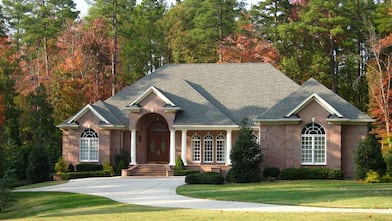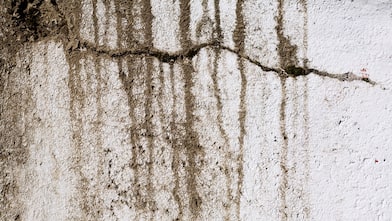Get the low down on this sneaky, leaky situation
You may not give what your house sits on top of much thought—until there’s a problem. If you notice cracks in your walls or a mysterious sound of running water, you may have a slab leak on your hands. Never heard of it? Not to worry. Read on for everything you need to know about what a slab leak is, and what to do if you suspect your home’s got one.
What Is a Slab Leak?
A slab leak refers to a leak that occurs underneath a concrete foundation. If left untreated, they can damage the foundation, floors, and walls of your home. But by keeping your eyes peeled for telltale signs of a slab leak, like cracks in your walls and unusual sounds, you can help protect your home’s foundation. When it comes to spotting a slab leak, here's what you need to know.
Signs of Slab Leaks
If you have a leak in your roof or your basement, chances are you’ll notice it as soon as you step into the room. But if your home has a slab leak, it can be a little more difficult to detect. Here are some signs to look out for.
Warm Floor
One common sign of a slab leak is a warm spot or spots on your floor. This could indicate that there’s a leak in your hot water pipe that’s causing a slab leak.
Running Water Sound
If you hear running water when no appliances in your house are using water, it could be a sign that a pipe has burst and is causing a slab leak. You may also hear a hissing sound from a smaller leak.
Cracks in Your Foundation or Walls
Over time, even a small slab leak can cause some serious damage to your home’s foundation, walls, and ceiling. While slab leaks aren’t the only cause of cracks in your walls or foundation, if you see any cracks in these locations, it could be a sign of a slab leak.
High Water Bill
If your water bill is climbing even though your usage has remained steady, it could mean that there’s a burst pipe beneath your home. You should get in touch with a plumber near you to inspect your home.
Puddles or Water Damage
Puddles or visible water damage like warped or moldy floors are another possible sign of a slab leak. These puddles often occur in areas near major plumbing components, like bathrooms and kitchens.
What Causes Slab Leaks?
There are a few common causes of slab leaks, including leaky or broken pipes and soil shift.
Pressure on Pipes
Pipes buried underground are often subject to significant pressure. This pressure can increase if you experience an earthquake, or if the ground underneath your foundation shifts. If a pipe is under too much pressure, it may burst and cause a slab leak.
Plumbing Materials
Some plumbing materials are more susceptible to leaks. In particular, galvanized steel or cast iron pipes are vulnerable to corrosion. Other pipe materials, such as plastic, also suffer from abrasion as a result of small vibrations.
Soil Shift
If the soil shifts underneath your home, it could cause a slab leak and damage your foundation. Soil that absorbs water and expands can damage pipes and contribute to leaks underneath your home.
How to Fix Slab Leaks
It’s important to fix slab leaks right away, but it’s not a good fit for a DIY project, since it requires skills and experience the average homeowner doesn’t usually have. If you suspect a leak beneath your home, you should work with an experienced contractor who can check it out and recommend next steps. Depending on the size and location of the slab leak, you may need to reroute the leaky pipe, or even repipe your entire house.
If a slab leak damages your foundation, it can hurt your homes structural integrity. Foundation slab leak repair costs around $2,300, while the cost of a new concrete slab is between $3,600 and $7,200. Costs vary depending on the size, thickness, and placement of the slab.
Keep in mind—slab leaks aren't the only cause of foundation damage. Other issues include expansive soil, frost heave, and varying foundation depths.





